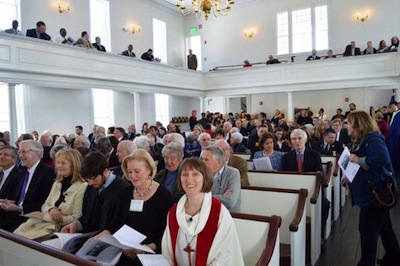It is not news to anyone that mainline Protestant Christian denominations are simultaneously the most liberal and the most white. Despite that, the findings of a new study published in the Journal for the Scientific Study of Religion may raise a few eyebrows:
This article reports the results of a nationwide audit study testing how Christian churches welcome potential newcomers to their churches as a function of newcomers’ race and ethnicity. We sent email inquiries to 3,120 churches across the United States. The emails were ostensibly from someone moving to the area and looking for a new church to attend. That person’s name was randomly varied to convey different racial and ethnic associations. In response to these inquiries, representatives from mainline Protestant churches—who generally embrace liberal, egalitarian attitudes toward race relations—actually demonstrated the most discriminatory behavior. They responded most frequently to emails with white-sounding names, somewhat less frequently to black- or Hispanic-sounding names, and much less to Asian-sounding names. They also sent shorter, less welcoming responses to nonwhite names. In contrast, evangelical Protestant and Catholic churches showed little variation across treatment groups in their responses.
So, it’s those crazy evangelicals and Catholics–long associated with the American right and therefore with bigotry of every description–who were actually the most welcoming to minorities.
(Hat tip to Secular Right on this one.)

In Oregon, I love helping every year with Congreso as part of San Juan Diego. The Hispanic community brought their religious, family-oriented life to the US, and in particular to Oregon which is a state renowned for its lack of religious belief. Last year we had a guy speak who had left his gang (!!!!), married the woman he had had kids with, and they are now raising a family. That’s the kind of guy I want to see in church.
This report also matches my experiences. The two places I’m mostly likely to see mixed ethnicities is either in a Catholic church or in an evangelical church. In fact, as we have seen with votes like Prop 8, African American and Hispanic voters are overwhelmingly conservative in their beliefs, and they generally belong to conservative religious groups. Furthermore, the Chinese and Korean immigrants I’ve met are overwhelmingly evangelical.
Lastly, as a funny side note, I’ve noticed living in the West this terrible hilarity where people agonize about colonialism and racism, and then turn around the next moment to completely denigrate and ignore the views of African and Asian Christians. Here’s one African student in Europe reporting how Europeans don’t take her views seriously and assume she must believe these things because she just hasn’t been educated yet:
http://www.firstthings.com/blogs/firstthoughts/2014/10/africans-criticize-cardinal-kaspers-remarks-1
This is one more reason I tend not to really worry about the future, beyond of course Jesus’ promises about his church. The mainline churches have no fire, they don’t attract anyone, and they lose even the few members they have.
“For to every one who has will more be given, and he will have abundance; but from him who has not, even what he has will be taken away.”